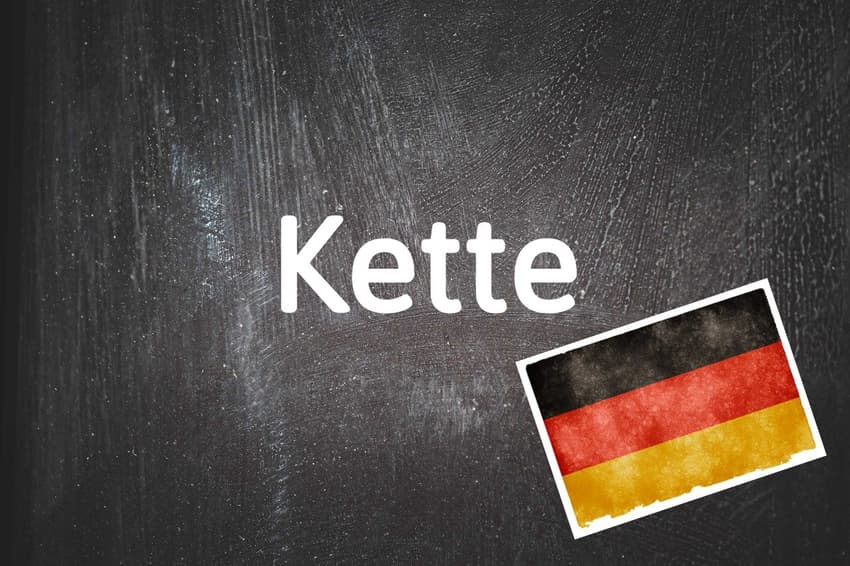German word of the day: Kette

From describing the stunning natural landscape in Germany's lake district to understanding international trade issues, this is a German word you won't be able to do without.
Why do I need to know Kette?
While it may not be too useful by itself, Kette is a noun you'll find attached to other words in many of Germany's famous compound nouns - so it's definitely worth knowing what it means.
In fact, you'll hear it everywhere from the bike repair shop to news articles about economics and even chemistry analogies.
What does it mean?
The feminine noun die Kette (pronounced like this) is the same as the English word 'chain'. It's what keeps your wheels moving on your bicycle and what jewellers use to make necklaces (or Halzketten in German - literally, throat chains).
Like the English 'chain' though, Kette is an incredibly versatile word that can describe anything that's linked to something else. For instance, the northern state of Brandenburg has a famous Seenkette - a chain of lakes that weaves through the rural landscape for several miles.
When you're reading about the fall-out from the Covid pandemic, you may hear about issues with the Lieferketten - or supply chains - that have affected trade between Europe and China in particular. When you're at a protest or demonstration, you may see people link arms to form a Menschenkette - or chain of people - and it's pretty normal to decorate your home with Lichterketten (fairy lights) at Christmas time.
There's also a helpful idiom (originally from chemistry and physics) that you can use to describe a situation where a small event spirals into a larger one. When a situation like this is getting out of hand, you may worry that something you've done has set off a Kettenreaktion - or chain reaction.
READ ALSO: German word of the day: Klartext
Use it like this:
Seine Worte lösten eine unangenehme Kette von Ereignissen aus.
His words set off an unpleasant chain of events.
Kannst du mir bitte helfen? Meine Fahrradkette is abgesprungen.
Can you help me please? My bike chain's come off.
Comments
See Also
Why do I need to know Kette?
While it may not be too useful by itself, Kette is a noun you'll find attached to other words in many of Germany's famous compound nouns - so it's definitely worth knowing what it means.
In fact, you'll hear it everywhere from the bike repair shop to news articles about economics and even chemistry analogies.
What does it mean?
The feminine noun die Kette (pronounced like this) is the same as the English word 'chain'. It's what keeps your wheels moving on your bicycle and what jewellers use to make necklaces (or Halzketten in German - literally, throat chains).
Like the English 'chain' though, Kette is an incredibly versatile word that can describe anything that's linked to something else. For instance, the northern state of Brandenburg has a famous Seenkette - a chain of lakes that weaves through the rural landscape for several miles.
When you're reading about the fall-out from the Covid pandemic, you may hear about issues with the Lieferketten - or supply chains - that have affected trade between Europe and China in particular. When you're at a protest or demonstration, you may see people link arms to form a Menschenkette - or chain of people - and it's pretty normal to decorate your home with Lichterketten (fairy lights) at Christmas time.
There's also a helpful idiom (originally from chemistry and physics) that you can use to describe a situation where a small event spirals into a larger one. When a situation like this is getting out of hand, you may worry that something you've done has set off a Kettenreaktion - or chain reaction.
READ ALSO: German word of the day: Klartext
Use it like this:
Seine Worte lösten eine unangenehme Kette von Ereignissen aus.
His words set off an unpleasant chain of events.
Kannst du mir bitte helfen? Meine Fahrradkette is abgesprungen.
Can you help me please? My bike chain's come off.
Join the conversation in our comments section below. Share your own views and experience and if you have a question or suggestion for our journalists then email us at [email protected].
Please keep comments civil, constructive and on topic – and make sure to read our terms of use before getting involved.
Please log in here to leave a comment.